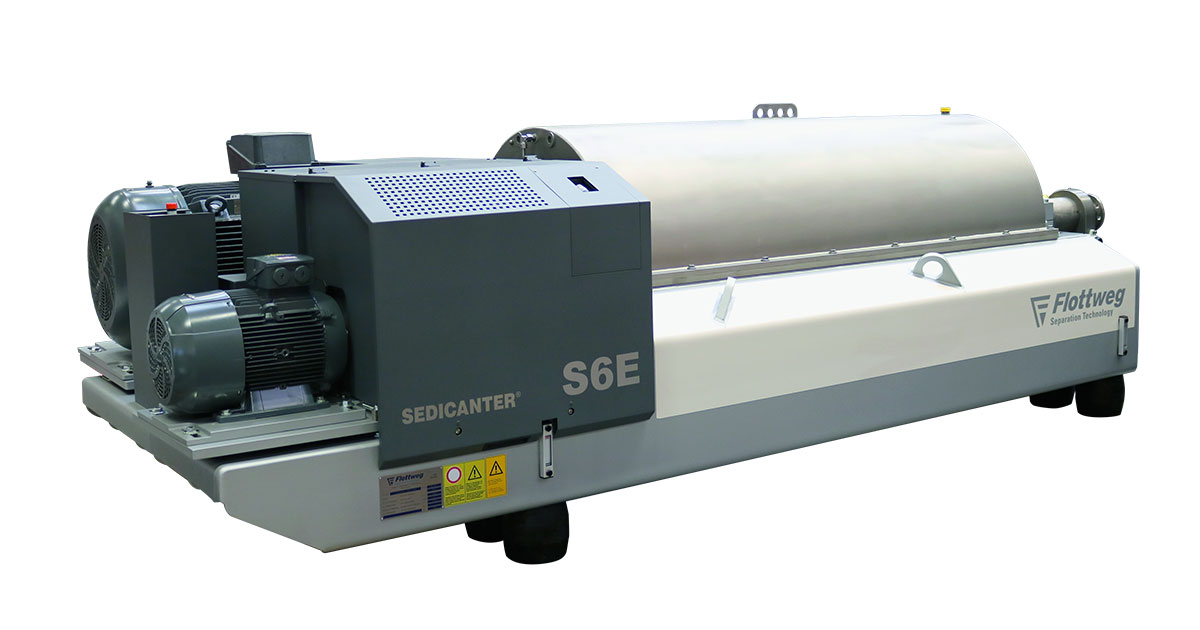2021-07-15
DON’T „CELL“ YOUR STOCK TOO SOON

High-quality and therefore reliable components are a prerequisite for the machines, as the product is often not biologically stable for a very long time.Georg Eierkaufer Georg Eierkaufer studied chemical engineering at the Technical University of Munich. He has been employed as a sales engineer at Flottweg SE for 10 years and specializes in the fields of biotechnology and plant extracts.
As a collective term, biotechnology stands for an almost unmanageable variety of processes, products and methods. The possible uses of biotechnology are not limited to one area, but are very diverse. Biotechnologists research microorganisms, plants, animals and humans, but also the smallest parts such as individual cells or molecules. Biotechnology has been used for a long time, for example in the production of bread, wine and beer. In the following interview, Georg Eierkaufer, sales engineer at Flottweg SE, deals with the topic and shows the decisive advantage that modern separation technology solutions have on the manufacturing process.
What is Biotechnology?
Biotechnology is the production of organic compounds from renewable raw materials by means of enzymes or organisms such as yeasts, bacteria or fungal cultures.
Where does Biotechnology come from and what do you need it for?
Biotechnology has existed for thousands of years – classic examples are beer and wine production. But nowadays, industrial biotechnology is becoming increasingly important. On the one hand, the aim is to replace crude oil-based products with renewable raw materials. The classic example here is the plastics industry, keyword bioplastic or bioethanol as a substitute for fossil fuels.
On the other hand, the rapidly growing world population is also creating a demand for naturally occurring products, but these are not available in the required quantity. A good example of this is citric acid - a lemon soda has usually never seen a real lemon.
Biotechnology is a broad field – into which areas can it be divided?
Biotechnology is mainly divided into 4 areas: green, red, white and grey biotechnology. Green biotechnology deals with plants, mainly for agriculture. It is mainly concerned with helping to ensure food security for the world's growing population.
Red biotechnology is responsible for the medical sector, such as the manufacture of medicines and drugs in the pharmaceutical industry. The fastest growing area of biotechnology is white or industrial biotechnology, which deals with food but to an even greater extent with the production of basic chemicals such as acetone, ethanol or the citric acid mentioned above.
Finally, and just as important, is grey biotechnology which deals with waste and wastewater treatment in the environmental sector. Every wastewater treatment plant in the world has a biodegradation stage for organic contaminants in wastewater.
In which areas of Biotechnology is separation technology used?
Separation technology is used whenever the organisms that have passed through the biotechnological process have to be separated from the liquid again. Examples would be to separate yeast from beer after sugar has become alcohol, in general to separate bacteria from fermentation liquids and also to separate the biological sludge from the purified waste water in the waste water area.
What separation solutions are used here?
The goal is to clarify the liquid. Depending on the separation process requirements, centrifuges or filtering devices are used.
What is particularly important in separation?
As a rule, the liquid is the product or at least contains the product. It is very important to clarify the liquid to the greatest possible degree before further process steps, and to ensure that the solids are as dry as possible. Liquid that remains in the solids after the separation process is synonymous with product loss, i.e. lower yield and thus lower profitability.
Are by-products produced in manufacturing, and what can be done with them?
By-products are produced partly in the form of biomass, which is then used as organic fertilizer or feed additive in agriculture.
Is hygienic machine design important?
Depending on the biotechnological field, a hygienic design is very important. Hygienic design of the machines is a prerequisite in red biotechnology, i.e. the pharmaceutical industry and the manufacture of drugs. But hygienic design and easy cleaning of the machines also plays an increasingly important role in the area of white biotechnology. In some cases, the requirements hardly differ from those of the pharmaceutical industry.
What does Flottweg offer its customers in the area of hygienic designs?
Flottweg offers machines for automatic cleaning (CIP=cleaning in place) that do not need to be opened and manually cleaned. Often the customer’s manufacturing processes are GMP-certified, and we can support our customers by validating our machines for their manufacturing process and provide the necessary documents and certificates.
What sets Flottweg apart from its competitors?
The quality of our products and customer support. This support begins with a detailed consultation and no-charge laboratory tests. This is followed by pilot tests to accurately design the machines, commissioning at the customer’s premises, and then process optimization and integration into their entire system. Only with high-quality products and fast, competent support from the supplier can the customer achieve the best possible success for themselves. And our goal is the success of the customer, because only then we will be successful
What makes Flottweg particularly interesting for customers in this area?
Our product range in this area: We are the only industrial centrifuge provider in the world that can offer decanters, Sedicanter® and disc stack centrifuges with intermittent and continuous discharge. Depending on the customers’ requirements and the separation process, we can always provide the optimal solution for best separation results. Since we manufacture all these different products, we can also provide the customer with expert advice on the possibilities of each type of machine and their respective advantages and disadvantages, so that the best solution for the customer emerges as a result.
The Sedicanter® has been specially developed by Flottweg for fine-grained products. What distinguishes the Sedicanter® from decanters and disc separators?
The Sedicanter® combines the advantages of the two machines without having to accept their respective disadvantages: the Sedicanter® can separate and dewater very fine solids and also high concentrations of solids in the feed using high g-force. The decanter can dewater high concentration solids effectively, but has too little g-force for the separation of very fine solids. The disc separator can easily separate very fine solids using a high g-force, but reaches its limits at higher solids contents and the separated solid is only slightly thickened. The Sedicanter® therefore combines the positive properties of both machines - with the restriction that it is only suitable for soft, fine solids. But this is exactly what fermentation in biotechnology is all about.
Why is it important in this area to rely on particularly high-quality components?
High-quality and therefore reliable components are a prerequisite for the machines, as the product is often not biologically stable for a very long time. Therefore, longer machine downtimes mean loss of product and lost profit for the customer.
In many plants, our machines run around the clock all year round. Longer downtimes or increased staff for monitoring and maintenance are often not possible or entail high costs for the customer. Customers appreciate the high quality of Flottweg components and that they do not have to worry about them except for normal maintenance intervals.
What does the future look like in this area?
Rosy! Due to global population growth and increasingly scarce natural resources such as crude oil or clean drinking water, significant growth is expected in the area of biotechnology. In the spotlight of the global public are many related areas, such as more efficient use of renewable raw materials or biodegradable plastics. Intensive research is being carried out and new large-scale plants based on biotechnological manufacturing processes are being created worldwide.
 The Sedicanter combines the advantages of the two machines without having to accept their respective disadvantages
The Sedicanter combines the advantages of the two machines without having to accept their respective disadvantages